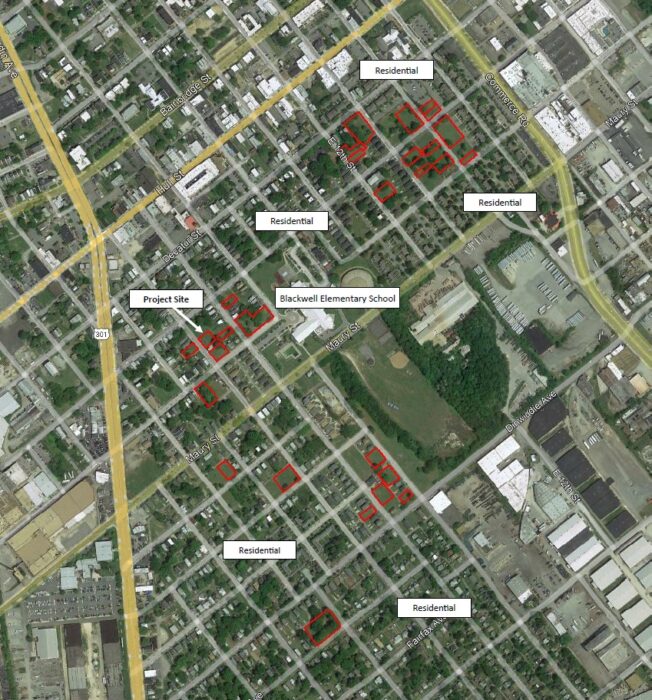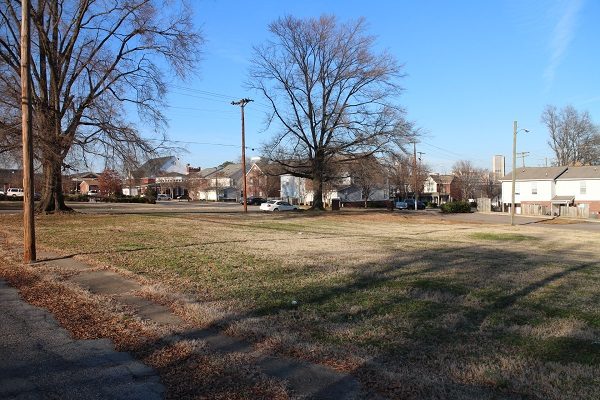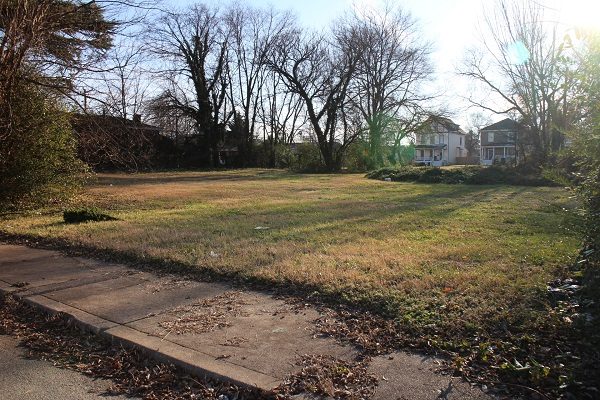It was 2019 when dozens of vacant lots in Richmond’s Blackwell neighborhood were earmarked for nonprofit groups to develop as income-based housing.
Four years later, the land remains in limbo, with little sign to some observers that homes will be built on the lots anytime soon.
The Richmond Redevelopment & Housing Authority, which owns the lots, is aiming to get the land transferred to developers this year, after submitting a request to the U.S. Department of Housing and Urban Development (HUD) to release grant funds for the project. The City of Richmond planned to authorize that request this week, according to a notice posted last month.
But Erica Sims, CEO of Maggie Walker Community Land Trust, which was one of the developers awarded the lots, said her interactions with HUD have given no indication that the parcels will be transferred in the foreseeable future.
“I have received absolutely no assurances from the project managers we’re working with at HUD that they are anywhere closer to transferring these properties to us,” Sims said.
Noting the process is nearing the five-year mark since a solicitation went out in fall 2018, Sims added, “There is no excuse for taking five years to transfer a small number of vacant lots for single-family affordable housing development that arguably should be the simplest project in the world. These are just lots that are ready to be developed.”
The land at issue consists of 55 lots that were among 96 offered in the 2018 request for proposals. The lots are scattered across several blocks east of Decatur Street between Commerce Road and Richmond Highway, with the largest concentrations around Stockton and 10th streets, and south and west of Blackwell Elementary School and Charlie Sydnor Playground.

The 55 lots, shown in red, are scattered across several blocks in Blackwell. (Image courtesy City of Richmond)
The 55 lots, some of which have since been subdivided, were awarded in June 2019, when the RRHA board authorized the sale of 21 of the lots to the land trust and 34 to Southside Community Development & Housing Corp.
The land trust’s submission – a joint proposal with fellow housing nonprofits Better Housing Coalition, Project:Homes and Richmond Metropolitan Habitat for Humanity – was one of two responses the RRHA received to the RFP, which went out in October 2018.
Fifty of the lots were to be developed as “affordable housing,” defined by RRHA as homes for families earning at or below 80 percent of the city’s area median income. The other five lots were designated for market-rate homes, as were the remaining 41 lots that have yet to be awarded.
All of the 96 properties were tied to a 1997 HOPE VI grant that RRHA was awarded from HUD, which provides the bulk of RRHA’s funding for various programs. Because of that history and HUD’s involvement, the lots require HUD’s signoff before they can be transferred – a process that Sims said has taken far too long.
“I have been having biweekly meetings with HUD for over four years and edited documents they have requested over 25 times, and they are still not ready to sell those properties to us,” Sims said. “It’s definitely the craziest experience I’ve ever had in over 20 years of affordable housing development and working with HUD.”
Sims attributes the length of time to the HOPE VI association, which she said has resulted in a level of review and bureaucracy unlike other HUD-involved projects. She said the process has required two environmental reviews that the City of Richmond completed at RRHA’s expense. Details and costs of those reviews could not be confirmed in time for this report.
The notice posted last month by the city and RRHA conveyed the city’s finding that the development would have no significant impact on the human environment and therefore would not need an environmental impact statement under the National Environmental Policy Act.
The April 3 notice also mentioned the request to be made to HUD to release grant funds for the project, which has an estimated cost of over $9.8 million. A public comment period for the finding and release request concluded Sunday.
Sims said the notice should not be considered an indicator that the process is wrapping up, describing it as one more of many regulatory steps that have needed to be taken.
“Definitely I have a level of cynicism at this point,” she said. “All that this process says to me is that the city has yet again done its job, and now HUD has one less item that they can say to go out and do.”
But Steven Nesmith, RRHA’s CEO, said the housing authority is hoping the transfer process can be completed this summer, spurred recently by Nesmith working his connections with HUD, where he was an assistant secretary for two years in the early 2000s.
“I have a very strong relationship with HUD in Washington, D.C., and basically leveraged my relationships there to bring all the parties together, because this has been languishing for many, many years,” said Nesmith, who joined RRHA as CEO last fall.
“We are very hopeful that sometime this summer we will close out on this project and it’ll move forward, and it will be a net positive towards the affordable housing goals that we have here at RRHA,” he said.
In a statement to BizSense, a HUD spokesperson said the agency “continues to support the Authority with the Blackwell development effort,” adding that its Office of Urban Revitalization continues to review RRHA’s redevelopment proposals for the Blackwell HOPE VI grant.
“HUD meets regularly with the Authority and the City of Richmond as they work to secure the necessary approvals,” the statement said. “Once the Authority receives the required approvals for this complex development transaction, then it can proceed with the proposed Blackwell HOPE VI development effort in accordance with HOPE VI requirements.”
Sims said the land trust is waiting and ready, having gone forward with subdividing the larger of the lots in cooperation with RRHA, which as the property owner had to be the applicant for those changes.
“In an effort to move this forward and get it as far along as we can while RRHA continues to wait for HUD, RRHA has agreed to let us move forward with subdividing the lots, which we have done,” Sims said. “That cuts a little time off of our future construction process, so we were happy to do that.”
Adding that RRHA “went so far as to commit” to reimbursing the land trust for costs associated with that, Sims said, “They are doing a great job in trying to get these to us. It’s really HUD that is the huge barrier.”
As for the remaining 41 lots, RRHA spokeswoman Angela Fountain said it wasn’t clear why those lots were not included in the 2019 awards. Fountain said those lots are being evaluated for homeownership and rental opportunities and will likely be part of a future RFP.
It was 2019 when dozens of vacant lots in Richmond’s Blackwell neighborhood were earmarked for nonprofit groups to develop as income-based housing.
Four years later, the land remains in limbo, with little sign to some observers that homes will be built on the lots anytime soon.
The Richmond Redevelopment & Housing Authority, which owns the lots, is aiming to get the land transferred to developers this year, after submitting a request to the U.S. Department of Housing and Urban Development (HUD) to release grant funds for the project. The City of Richmond planned to authorize that request this week, according to a notice posted last month.
But Erica Sims, CEO of Maggie Walker Community Land Trust, which was one of the developers awarded the lots, said her interactions with HUD have given no indication that the parcels will be transferred in the foreseeable future.
“I have received absolutely no assurances from the project managers we’re working with at HUD that they are anywhere closer to transferring these properties to us,” Sims said.
Noting the process is nearing the five-year mark since a solicitation went out in fall 2018, Sims added, “There is no excuse for taking five years to transfer a small number of vacant lots for single-family affordable housing development that arguably should be the simplest project in the world. These are just lots that are ready to be developed.”
The land at issue consists of 55 lots that were among 96 offered in the 2018 request for proposals. The lots are scattered across several blocks east of Decatur Street between Commerce Road and Richmond Highway, with the largest concentrations around Stockton and 10th streets, and south and west of Blackwell Elementary School and Charlie Sydnor Playground.

The 55 lots, shown in red, are scattered across several blocks in Blackwell. (Image courtesy City of Richmond)
The 55 lots, some of which have since been subdivided, were awarded in June 2019, when the RRHA board authorized the sale of 21 of the lots to the land trust and 34 to Southside Community Development & Housing Corp.
The land trust’s submission – a joint proposal with fellow housing nonprofits Better Housing Coalition, Project:Homes and Richmond Metropolitan Habitat for Humanity – was one of two responses the RRHA received to the RFP, which went out in October 2018.
Fifty of the lots were to be developed as “affordable housing,” defined by RRHA as homes for families earning at or below 80 percent of the city’s area median income. The other five lots were designated for market-rate homes, as were the remaining 41 lots that have yet to be awarded.
All of the 96 properties were tied to a 1997 HOPE VI grant that RRHA was awarded from HUD, which provides the bulk of RRHA’s funding for various programs. Because of that history and HUD’s involvement, the lots require HUD’s signoff before they can be transferred – a process that Sims said has taken far too long.
“I have been having biweekly meetings with HUD for over four years and edited documents they have requested over 25 times, and they are still not ready to sell those properties to us,” Sims said. “It’s definitely the craziest experience I’ve ever had in over 20 years of affordable housing development and working with HUD.”
Sims attributes the length of time to the HOPE VI association, which she said has resulted in a level of review and bureaucracy unlike other HUD-involved projects. She said the process has required two environmental reviews that the City of Richmond completed at RRHA’s expense. Details and costs of those reviews could not be confirmed in time for this report.
The notice posted last month by the city and RRHA conveyed the city’s finding that the development would have no significant impact on the human environment and therefore would not need an environmental impact statement under the National Environmental Policy Act.
The April 3 notice also mentioned the request to be made to HUD to release grant funds for the project, which has an estimated cost of over $9.8 million. A public comment period for the finding and release request concluded Sunday.
Sims said the notice should not be considered an indicator that the process is wrapping up, describing it as one more of many regulatory steps that have needed to be taken.
“Definitely I have a level of cynicism at this point,” she said. “All that this process says to me is that the city has yet again done its job, and now HUD has one less item that they can say to go out and do.”
But Steven Nesmith, RRHA’s CEO, said the housing authority is hoping the transfer process can be completed this summer, spurred recently by Nesmith working his connections with HUD, where he was an assistant secretary for two years in the early 2000s.
“I have a very strong relationship with HUD in Washington, D.C., and basically leveraged my relationships there to bring all the parties together, because this has been languishing for many, many years,” said Nesmith, who joined RRHA as CEO last fall.
“We are very hopeful that sometime this summer we will close out on this project and it’ll move forward, and it will be a net positive towards the affordable housing goals that we have here at RRHA,” he said.
In a statement to BizSense, a HUD spokesperson said the agency “continues to support the Authority with the Blackwell development effort,” adding that its Office of Urban Revitalization continues to review RRHA’s redevelopment proposals for the Blackwell HOPE VI grant.
“HUD meets regularly with the Authority and the City of Richmond as they work to secure the necessary approvals,” the statement said. “Once the Authority receives the required approvals for this complex development transaction, then it can proceed with the proposed Blackwell HOPE VI development effort in accordance with HOPE VI requirements.”
Sims said the land trust is waiting and ready, having gone forward with subdividing the larger of the lots in cooperation with RRHA, which as the property owner had to be the applicant for those changes.
“In an effort to move this forward and get it as far along as we can while RRHA continues to wait for HUD, RRHA has agreed to let us move forward with subdividing the lots, which we have done,” Sims said. “That cuts a little time off of our future construction process, so we were happy to do that.”
Adding that RRHA “went so far as to commit” to reimbursing the land trust for costs associated with that, Sims said, “They are doing a great job in trying to get these to us. It’s really HUD that is the huge barrier.”
As for the remaining 41 lots, RRHA spokeswoman Angela Fountain said it wasn’t clear why those lots were not included in the 2019 awards. Fountain said those lots are being evaluated for homeownership and rental opportunities and will likely be part of a future RFP.







Have to ask who benefits from the current status quo, when getting these houses built seems to be well within the mission of all involved.
I suspect this is such a small deal for HUD that its paperwork has fallen through the cracks somewhere in the bureaucracy. It was probably assigned to someone “working” remotely during Covid and, well . . . not all remote work gets completed as it should.
“I have been having biweekly meetings with HUD for over four years and edited documents they have requested over 25 times, and they are still not ready to sell those properties to us,” Sims said
Can’t have that many meetings and say something has fallen through the cracks; you can say – “that’s the Government”!
Yes, because government ineptitude and bureaucracy only crept in once remote work became more normalized.
That’s a lazy excuse.
This is simply another example of the inefficiency of Federal Government agencies. There is simply no excuse why HUD hasn’t acted on this project, particularly when there’s an outcry for affordable housing. It should be a priority, regardless of the size of the project.
If these properties had been in private hands there would be homes with taxpayers in them for the last 4.5 years.
Three to fours years is normal for HUD project application and their review for several years now. Heck the state has a HUD funded program called Urgent Needs that is to help with LMI households effect by natural disasters. These projects usually do NOT buy/sell land but rehab or reconstruct damaged homes from a say a tornado. It can take 18-24 months after the event for all the application/pre-award activities can be completed and approved by HUD. Generally it takes another year before the first homes are repaired/replaced. So 4 years on a project that involves land transfers and new… Read more »
It may seem right – but this inefficiency is NOT ok. This is what happens when “grant” money is given. People accept inefficiency because it is free money.
This is a story that needed to be told. Housing is in such short supply and government entities are sitting on tons of vacant developable land in Richmond. To make matters worse a lot of the not for profit housing that has been built in that neighborhood has been wildly inefficient from a land use perspective. Lots that support two or three homes by right are having just one single family home built on them. Can’t begin to dig out of this affordable housing crisis under these circumstances. To be clear, the factors that are making affordable housing so difficult… Read more »
Thank you for covering this important story, BizSense! Hopeful others support your journalism in reporting these in-depth, complicated stories which other publications aren’t covering.
“I am from the government and am hear to help you.”
here to help you…..
hear, here! tee hee!